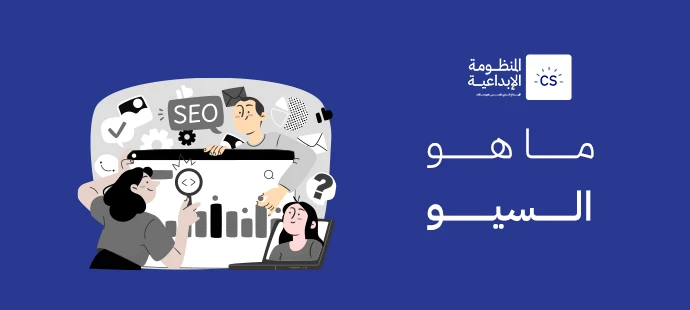SEO
What is SEO?
645 Views | 2 hours ago | Published On: April 09,2025 - Last Updated: February 23,2026

Content
Learn what SEO is and how to optimize your website for search engines using outstanding content to rank higher and attract more visitors.

In today’s internet age, search engines have become essential tools used by millions of people every day to find information and services. Therefore, if you own a website or blog, understanding how to optimize for search engines (SEO) is crucial for achieving success. But what exactly is SEO, and how can you benefit from it? In this article, we’ll take you on a comprehensive journey through what SEO is and how to apply it successfully to your site.
What is SEO?
SEO, or Search Engine Optimization, is a set of strategies and activities aimed at improving your website’s ranking in search engine results like Google and Bing. The goal of understanding what SEO is lies in making your website more compatible with the algorithms these search engines use, resulting in your site appearing in top results when users search for keywords related to your content.
The Importance of SEO for Your Website
When learning about what SEO is, you might wonder how important this field really is. In reality, SEO is one of the most powerful tools to attract visitors to your site in a natural and effective way. By accurately and correctly applying SEO strategies, your website can appear among the top results in search engines like Google, significantly increasing its visibility.
This not only leads to more traffic but also improves engagement with your content and increases the chances of business success overall.
Key Elements of SEO
There are many factors that influence website rankings on search engines and play a crucial role in boosting your site’s visibility. Some of the most prominent factors include:
- Keywords: Keywords are a fundamental part of any SEO strategy. Selecting the most relevant keywords for your site’s content and using them naturally and evenly across texts, titles, and descriptions is critical. Focusing on keywords your target audience searches for increases the chances of appearing in relevant search results.
- Content Optimization: Quality content is the cornerstone of SEO success. High-quality, helpful content is one of the key factors that improve your website’s search engine ranking. It’s not enough for content to be useful; it must also be accurate, detailed, and well-organized in a way that captures attention and meets users' needs. The more diverse and comprehensive your content is, the higher the chance it will rank well.
- Internal and External Linking: Internal links between your own pages and external links from reputable sites both contribute significantly to improving your search engine rankings. Internal links make it easier for users to navigate your website, while backlinks act as endorsements from other websites, boosting your site's credibility in the eyes of search engines.
- Site Speed: Page load speed is a critical ranking factor for search engines. Search engines prioritize websites that offer a smooth and fast user experience. Even a slight delay in load time can lead to a drop in rankings and lost visitors. Therefore, you should optimize your website’s speed by compressing images, using caching techniques, and improving your code.
- Mobile-Friendliness: Since a large portion of users access the internet via mobile devices, ensuring your website is fully compatible with them is essential. A responsive design that offers a seamless experience across all devices helps improve your ranking, as search engines favor mobile-friendly websites.
In summary, understanding what SEO is and implementing a comprehensive strategy that includes these factors is key to improving your website’s performance and attracting visitors effectively.
On-Page SEO Strategies
On-page SEO includes all the actions and activities you perform within your website to improve its ranking in search engine results. Some of the most effective strategies include:
- Optimizing Titles and Descriptions: Titles and meta descriptions are crucial elements that directly impact your search engine ranking. They should be attractive and clear, incorporating your target keywords. The title is the first thing users see in search results, so it should be compelling and reflect your content. The meta description should be brief, accurate, and include relevant keywords to attract more visitors.
- Proper Use of Headings: Subheadings such as H1, H2, H3, etc., play a key role in structuring your content in a way that search engines can understand. Proper use of these headings helps search engines analyze your page’s content and identify the most important parts. Additionally, subheadings enhance the user experience by making it easier to navigate through the content.
- Image Optimization: Images play a vital role in capturing user attention, but they must be optimized to maintain fast loading speeds. Make sure to compress images to reduce file size without sacrificing quality. Also, use descriptive alt text that aligns with the page’s content and target keywords. This not only helps with SEO but also improves accessibility for visually impaired users.
By understanding what SEO is and improving these on-site factors, you can enhance the visitor experience and help search engines better interpret your content—ultimately improving your ranking.
Must-Have SEO Tools
You can’t implement an effective SEO strategy without knowing what SEO is and using the right tools. Here are some of the most useful tools for improving your SEO results:
- Google Analytics – To monitor your site’s performance and analyze visitor behavior.
- Google Search Console – To track and analyze your site’s ranking in search results.
- Ahrefs – To analyze backlinks and keywords.
- SEMrush – To research competitors and refine your SEO strategies.
Common SEO Mistakes and How to Avoid Them
While implementing SEO strategies and learning what SEO is, many people make mistakes that can negatively impact their site’s performance. It’s important to be aware of these common errors and how to avoid them to achieve better results:
- Keyword Stuffing: Overusing the same keyword can lead to a drop in rankings.
- Neglecting Content Updates: Content should be regularly updated to reflect the latest information.
- Ignoring Internal Links: Internal navigation links improve user experience and help search engines crawl your site more effectively.
Final Thoughts
In conclusion, understanding what SEO is remains one of the most important ways to improve your website’s performance on the internet. By applying effective SEO strategies, your website can rank higher in search engine results, increasing your chances of reaching your target audience. If you’re aiming for excellence and visibility at the top of search engines, you must follow the latest SEO trends and focus on content quality and user experience.
As the importance of SEO continues to grow in the digital world, remember that success in this field depends on consistency and continuous learning. If you need help or personalized consultation on how to improve your website, don’t hesitate to reach out to Creative System, where we’ll help you build a customized SEO strategy tailored to your business goals.


